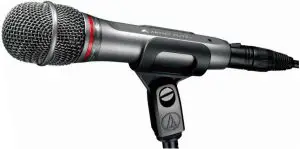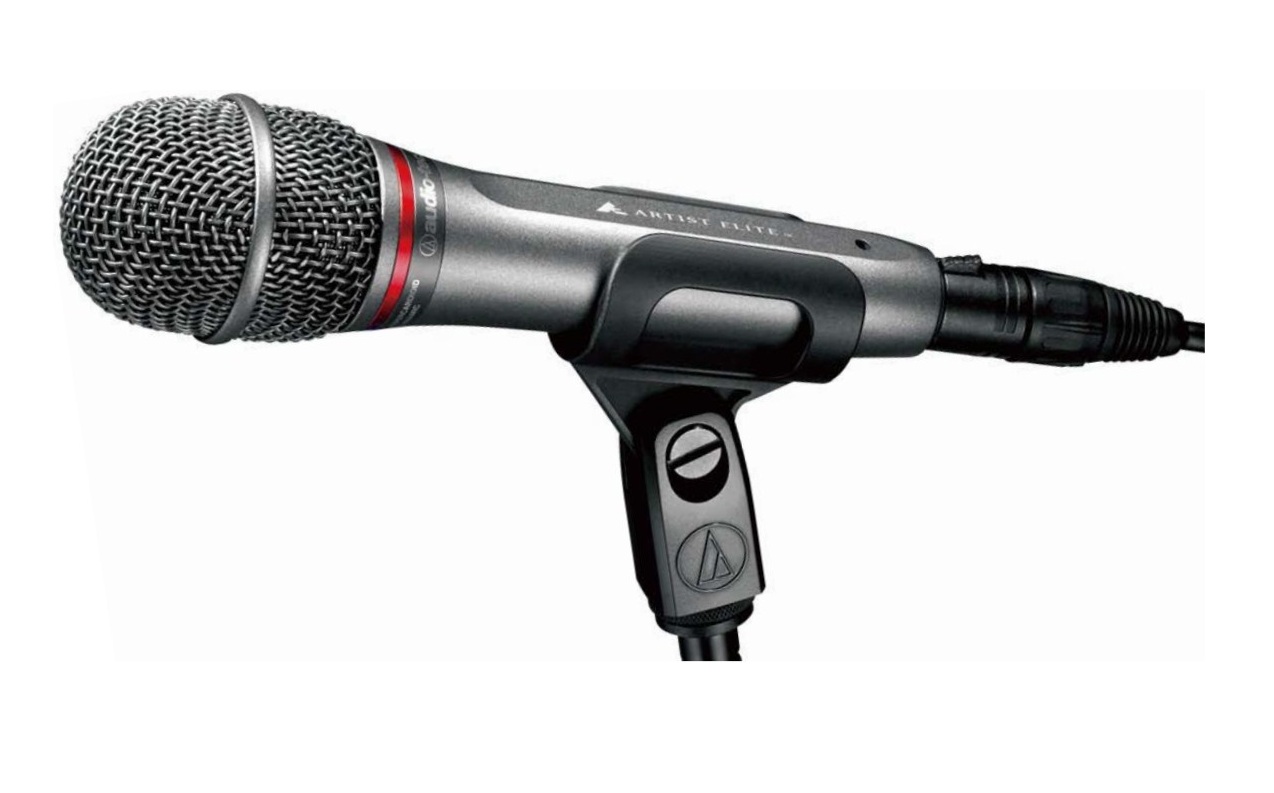audio-technica Hypercardioid Dynamic Handheld Microphone AE6100 User Manual
Thank you for purchasing this product. Before using the product, read through the user manual to ensure that you will use the product correctly.Please keep this manual for future reference.
Features
- Dynamic element gives pristine natural sound quality
- Tailored for an outstanding on-axis response
- Hardened steel body and grille for rugged durability
- High output, fast transients and clean articulation
- Multi-stage grille for reduced plosives and sibilance
- Superior anti-shock engineering for low handling noise
- Ergonomic design for easy handling
- Quiet-Flex stand clamp included for silent, flexible mic positioning
Notes on use
Output from the microphone’s XLRM-type connector is low impedance (Lo-Z) balanced. The signal appears across Pins 2 and 3; Pin 1 is ground (shield). Output phase is “Pin 2 hot” – positive acoustic pressure produces positive voltage at Pin 2.
To avoid phase cancellation and poor sound, all mic cables must be wired consistently: Pin 1-to-Pin 1, etc. For a high-impedance (Hi-Z) mic input, connect a Lo-Z balanced cable to a Hi-Z matching transformer (A-T CP8201 or equal) at the equipment input.
When using the AE6100 in settings with a stage monitor speaker, the speaker should be located 135° off axis (45° off the rear of the microphone). This placement, in conjunction with the microphone’s uniform hypercardioid pickup pattern, will virtually eliminate the possibility of undesired audio feedback.
The high sensitivity of the AE6100 assures useful output and an excellent match to most input sources. In some cases, however, an attenuator such as the Audio-Technica AT8202 may be required between the microphone and preamplifier to avoid overloading sensitive input stages.
Take care to keep foreign particles from entering the windscreen. An accumulation of iron or steel filings on the diaphragm, and/or foreign material in the windscreen’s mesh surface, can degrade performance.
Safety precaution
Although this product was designed to be used safely, failing to use it correctly may result in an accident. To ensure safety, observe all warnings and cautions while using the product.
Cautions for the product
- Do not subject the product to strong impact to avoid malfunction.
- Do not disassemble, modify or attempt to repair the product.
- Do not handle the product with wet hands to avoid electric shock or injury.
- Do not store the product under direct sunlight, near heating devices or in a hot, humid or dusty place.
Connection procedure
Connect the output terminals of the microphone to a device that has a microphone input (balanced input). The output connector is an XLRM-type with polarity as shown in the figure below.

Specifications
|
Element |
|
|
Polar pattern |
Hypercardioid |
| Frequency response |
60 – 15,000 Hz |
|
Open circuit sensitivity |
-55 dB (1.7 mV) re 1V at 1 Pa |
| Impedance |
250 ohms |
|
Weight |
310 g |
| Dimensions |
177.0 mm long, 48.0 mm head diameter, 33.0 mm to 22.0 mm tapered body diameter |
|
Output connector |
Integral 3-pin XLRM-type |
| Accessories furnished |
AT8470 Quiet-Flex stand clamp for 5/8″-27 threaded stands; 5/8″-27 to 3/8″-16 threaded adapter; soft protective pouch |
- 1 Pascal = 10 dynes/cm2 = 10 microbars = 94 dB SPL
- Typical, A-weighted, using Audio Precision System One
For product improvement, the product is sublect to modification without notice.
Polar pattern

SCALE IS 5 DECIBELS PER DIVISION
- LEGEND

Frequency response
 Frequency in Hertz
Frequency in Hertz
- LEGEND

Audio-Technica Corporation2-46-1 Nishi-naruse, Machida, Tokyo 194-8666, Japan©2017 Audio-Technica CorporationGlobal Support Contact: www.at-globalsupport.com
References
[xyz-ips snippet=”download-snippet”]

